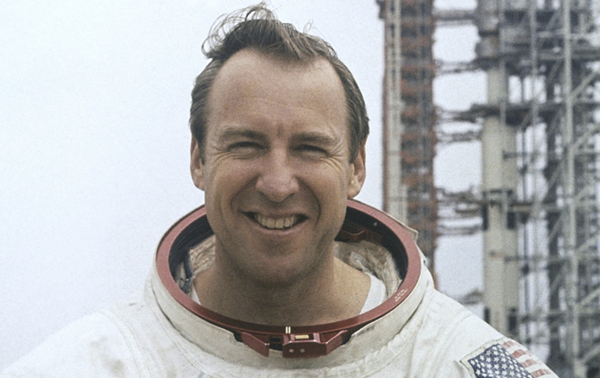James Lovell, the commander of Apollo 13 who helped turn a failed moon mission into a triumph of on-the-fly can-do engineering, has died. He was 97.
Lovell died Thursday in Lake Forest, Illinois, NASA said in a statement on Friday.
One of NASA’s most traveled astronauts in the agency’s first decade, Lovell flew four times — Gemini 7, Gemini 12, Apollo 8 and Apollo 13 — with the two Apollo flights riveting the folks back on Earth.
Lovell and fellow astronauts Fred Haise and Jack Swigert received renewed fame with the retelling of the Apollo 13 mission in the 1995 movie “Apollo 13" where actor Tom Hanks — portraying Lovell — famously said, “Houston, we have a problem.”
In 1968, the Apollo 8 crew of Lovell, Frank Borman and William Anders was the first to leave Earth’s orbit and the first to fly to and circle the moon. They could not land, but they put the U.S. ahead of the Soviets in the space race. Letter writers told the crew that their stunning pale blue dot photo of Earth from the moon, a world first, and the crew’s Christmas Eve reading from Genesis saved America from a tumultuous 1968.
But the big rescue mission was still to come. That was during the harrowing Apollo 13 flight in 1970. Lovell was supposed to be the fifth man to walk on the moon. But Apollo 13’s service module, carrying Lovell and two others, experienced a sudden oxygen tank explosion on its way to the moon. The astronauts barely survived, spending four cold and clammy days in the cramped lunar module as a lifeboat.
''The thing that I want most people to remember is (that) in some sense it was very much of a success,’' Lovell said during a 1994 interview. ''Not that we accomplished anything, but a success in that we demonstrated the capability of (NASA) personnel.’'
A retired Navy captain known for his calm demeanor, Lovell told a NASA historian that his brush with death affected him.
Lovell had ice water in his veins like other astronauts, but he didn’t display the swagger some had, just quiet confidence, said Smithsonian Institution historian Roger Launius. He called Lovell “a very personable, very down-to-earth type of person, who says ‘This is what I do. Yes, there’s risk involved. I measure risk.’”
it was during Lovell’s last mission that he came to embody for the public the image of the cool, decisive astronaut.
The Apollo 13 crew of Lovell, Haise and Swigert was on the way to the moon in April 1970, when an oxygen tank from the spaceship exploded 200,000 miles from Earth.
That, Lovell recalled, was “the most frightening moment in this whole thing.” Then oxygen began escaping and “we didn’t have solutions to get home.”
“We knew we were in deep, deep trouble,” he told NASA’s historian.
Four-fifths of the way to the moon, NASA scrapped the mission. Suddenly, their only goal was to survive.
Lovell’s “Houston, we’ve had a problem,” a variation of a comment Swigert had radioed moments before, became famous.
What unfolded over the next four days captured the imagination of the world.
With Lovell commanding the spacecraft, Kranz led hundreds of flight controllers and engineers in a furious rescue plan.
The loss of the opportunity to walk on the moon “is my one regret,” Lovell said in a 1995 interview with The Associated Press.
President Bill Clinton agreed when he awarded Lovell the Congressional Space Medal of Honor in 1995. “While you may have lost the moon ... you gained something that is far more important perhaps: the abiding respect and gratitude of the American people,” he said.
James A. Lovell was born March 25, 1928, in Cleveland. He attended the University of Wisconsin before transferring to the U.S. Naval Academy, in Annapolis, Maryland. On the day he graduated in 1952, he and his wife, Marilyn, were married.
A test pilot at the Navy Test Center in Patuxent River, Maryland, Lovell was selected as an astronaut by NASA in 1962.
Lovell retired from the Navy and from the space program in 1973, and went into private business. He and his family ran a now-closed restaurant in suburban Chicago, Lovell’s of Lake Forest.
(AP Photo: NASA file) (AP Photo/Wilfredo Lee, File)
Advertisement
'Houston, we have a problem;" astronaut James Lovell dies at 97
Advertisement
Latest State & National
State & National
11 hours ago
State & National
21 hours ago
State & National
yesterday
State & National
yesterday
State & National
yesterday
ADVERTISEMENT
Most Read >
ADVERTISEMENT
Latest State & National
State & National
11 hours ago
State & National
21 hours ago
State & National
yesterday
State & National
yesterday
State & National
yesterday
Advertisement
ADVERTISEMENT






